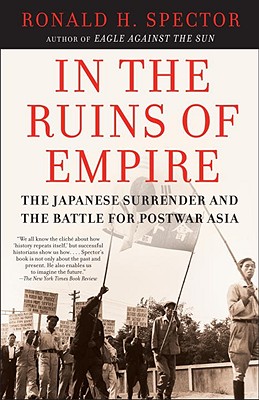In the Ruins of Empire: The Japanese Surrender and the Battle for Postwar Asia

In the Ruins of Empire: The Japanese Surrender and the Battle for Postwar Asia
The New York Times said of Ronald H. Spector's classic account of the American struggle against the Japanese in World War II, "No future book on the Pacific War will be written without paying due tribute to Eagle Against the Sun." Now Spector has returned with a book that is even more revealing. In the Ruins of Empire chronicles the startling aftermath of this crucial twentieth-century conflict. With access to recently available firsthand accounts by Chinese, Japanese, British, and American witnesses and previously top secret U.S. intelligence records, Spector tells for the first time the fascinating story of the deadly confrontations that broke out-or merely continued-in Asia after peace was proclaimed at the end of World War II. Under occupation by the victorious Allies, this part of the world was plunged into new power struggles or back into old feuds that in some ways were worse than the war itself. In the Ruins of Empire also shows how the U.S. and Soviet governments, as they secretly vied for influence in liberated lands, were soon at odds. At the time of the peace declaration, international suspicions were still strong. Joseph Stalin warned that "crazy cutthroats" might disrupt the surrender ceremony in Tokyo Bay. Die-hard Japanese officers plotted to seize the emperor's palace to prevent an announcement of surrender, and clandestine relief forces were sent to rescue thousands of Allied POWs to prevent their being massacred. In the Ruins of Empire paints a vivid picture of the postwar intrigues and violence. In Manchuria, Russian "liberators" looted, raped, and killed innocent civilians, and a fratricidal rivalry continued between Chiang Kai-shek's regime and Mao's revolutionaries. Communist resistance forces in Malaya settled old scores and terrorized the indigenous population, while mujahideen holy warriors staged reprisals and terror killings against the Chinese-hundreds of innocent civilians were killed on both sides. In Indochina, a nativist political movement rose up to oppose the resumption of French colonial rule; one of the factions that struggled for supremacy was the Communist Viet Minh led by Ho Chi Minh. Korea became a powder keg with the Russians and Americans entangled in its north and south. And in Java, as the Indonesian novelist Idrus wrote, people brutalized by years of Japanese occupation "worshipped a new God in the form of bombs, submachine guns, and mortars." Through impeccable research and provocative analysis, as well as
PRP: 145.49 Lei
Acesta este Prețul Recomandat de Producător. Prețul de vânzare al produsului este afișat mai jos.
116.39Lei
116.39Lei
145.49 LeiLivrare in 2-4 saptamani
Descrierea produsului
The New York Times said of Ronald H. Spector's classic account of the American struggle against the Japanese in World War II, "No future book on the Pacific War will be written without paying due tribute to Eagle Against the Sun." Now Spector has returned with a book that is even more revealing. In the Ruins of Empire chronicles the startling aftermath of this crucial twentieth-century conflict. With access to recently available firsthand accounts by Chinese, Japanese, British, and American witnesses and previously top secret U.S. intelligence records, Spector tells for the first time the fascinating story of the deadly confrontations that broke out-or merely continued-in Asia after peace was proclaimed at the end of World War II. Under occupation by the victorious Allies, this part of the world was plunged into new power struggles or back into old feuds that in some ways were worse than the war itself. In the Ruins of Empire also shows how the U.S. and Soviet governments, as they secretly vied for influence in liberated lands, were soon at odds. At the time of the peace declaration, international suspicions were still strong. Joseph Stalin warned that "crazy cutthroats" might disrupt the surrender ceremony in Tokyo Bay. Die-hard Japanese officers plotted to seize the emperor's palace to prevent an announcement of surrender, and clandestine relief forces were sent to rescue thousands of Allied POWs to prevent their being massacred. In the Ruins of Empire paints a vivid picture of the postwar intrigues and violence. In Manchuria, Russian "liberators" looted, raped, and killed innocent civilians, and a fratricidal rivalry continued between Chiang Kai-shek's regime and Mao's revolutionaries. Communist resistance forces in Malaya settled old scores and terrorized the indigenous population, while mujahideen holy warriors staged reprisals and terror killings against the Chinese-hundreds of innocent civilians were killed on both sides. In Indochina, a nativist political movement rose up to oppose the resumption of French colonial rule; one of the factions that struggled for supremacy was the Communist Viet Minh led by Ho Chi Minh. Korea became a powder keg with the Russians and Americans entangled in its north and south. And in Java, as the Indonesian novelist Idrus wrote, people brutalized by years of Japanese occupation "worshipped a new God in the form of bombs, submachine guns, and mortars." Through impeccable research and provocative analysis, as well as
Detaliile produsului









